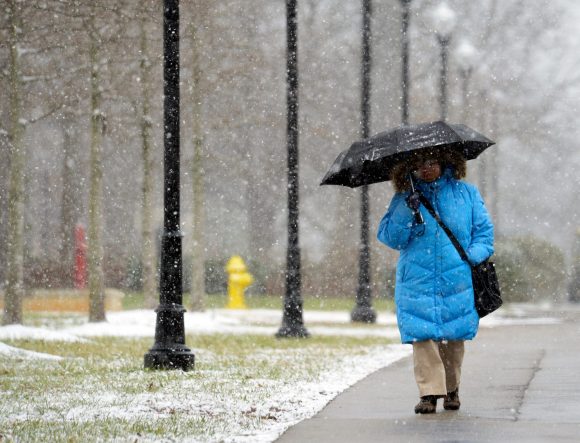
Back-to-Campus: Be Healthy and thinkSAFE
Whether it is your first time on campus or last semester, it is good to know of all resources available on campus to keep you safe and healthy. Our priority toward campus well-being starts with advertising of the many services our own Police Department and Safety and Risk Management office provides; in addition, many of our own staff are representatives, advocates or participants with other programs across campus.
The UTC Division of Enrollment Management and Student Affairs, led by Vice Chancellor Dr. Yancy Freeman, has professionals trained specifically to support you through your search for a university home. Once UTC is your university of choice, this team is here to guide and support from your first days on campus throughout their academic career—financial aid, orientation, student engagement, tutorials, career planning, multicultural activities and even more offices ready to enrich the student experience and to put students first.
Flu season is in full swing and University Health Services is offering vaccines for Mocs. Health Services delivers high quality healthcare that is holistic in nature and easily accessible for all UTC students. Services include, influenza (FLU) vaccines, treatment of acute illnesses, well-woman exams, physical exams, sexually transmitted infections evaluations, select immunizations, allergy shots, IV rehydration and physical therapy. Call their office, located at Maclellan Gym adjacent to Terrell Owens way, 423-425-2266 to setup an appointment.
The UTC Counseling Center staff embrace the unique identities of each student. They are committed to providing culturally competent counseling that is inclusive of our diverse student body in a safe, affirming space. Counseling is available in University Center, room 338, for students and intake hours are from 8:30 am to 3:30 pm daily. You may call for an appointment at: 423-425-4438. After 5:00 pm if you require after-hours services, please contact UTC Police at 423-425-4357 to obtain support.
The University Title XI office strives to prevent, address, and eliminate misconduct by responding to individual incidents, supporting those who have been harmed, and educating community members on how to create a safe and supportive campus that encourages healthy and respectful relationships. You may have seen Know More @ UTC flyer, advertising and signage around campus. The purpose is a comprehensive and collaborative prevention and education program about sexual misconduct, relationship violence and stalking. The Title XI Coordinator is Stephanie Rowland who can be reached by 423-425-4255.
List of other helpful on campus resources are:
We want to wish a happy 2020 to all students and remember to thinkSAFE this semester. Go Mocs!
|
|
Semester Test for UTC-ALERT (January 9th, 2019)
UTC-ALERT Test scheduled for Thursday, January 9th, 2020. It is only a test.
UTC-ALERT messages share with the campus community critical information during emergencies.
 Visual example of new alert method on Canvas. In addition to text, email, beacons and social media, the UTC-ALERT message will also go to UTC Learn (Canvas) home page. As the learning management system used by all students and faculty, this will add to our emergency messaging efforts. We want to thank the Walker Center for connecting UTC-ALERT into UTC Learn.
To lean more about the UTC-ALERT system visit www.utc.edu/alert
|
|

Weather Auto Safety Tips
Winter weather in the southeast United States can bring a myriad of troubles for drivers. Hazards, such as ice on roadways, snow, freezing rain or even dense fog, can complicate your travel. Follow these safety tips from the staff of UTC Emergency Services.
- Know the weather forecast by checking the National Weather Service at gov/mrx/
- Have your vehicle inspected for battery life (cold cranking amps), brakes, tire treads, antifreeze, and wiper fluid.
- Slow down and leave extra distance between you and other vehicles.
- On icy roadways, do not use cruise control. Drive slow enough that hard braking is not needed.
- When frozen precipitation is falling, keep the defroster on.
- In fog, use low-beam headlights.
- Remember that arriving safely should be a higher priority than driving fast.
For more information about the above topics, read on below.
Dense fog contributes to thousands of travels accidents every year. Visibility often changes quickly in fog and can be common due to altitudes of the surrounding area. Tips to avoid accidents during fog are to use your low-beam headlights, slow down, and leave plenty of distance between you and other vehicles.
Rain after a long dry stretch of time causes oil and other debris to accumulate on the road. When it has not rained for a while roads become slick and people are not accustom to driving in it. Rain with temperature near freezing can be a legitimate cause for concern. The important science behind when ice accumulates on the road is not just air temperature going below freezing but also road surface temperature. When a fine layer of ice forms during a freezing drizzle it may be hard to notice on the road, but it is one of winter’s most dangerous types of weather. Flash freeze is when wet roads freeze quickly at night or when there is a rapid drop in temperature behind a cold front. The first true snow fall of the year can also cause issues that include all of the above scenarios but more importantly that drivers having a hard time adjusting to the poor road conditions. Tips to avoid accidents in these hazards are to not use your vehicle’s cruise control, slow down, and leave plenty of distance between you and other vehicles.
There is a long history of deadly traffic accidents associated with intense snow events known as snow squalls. These occur when large amounts of snow are accompanied by strong winds that cause a reduction of reasonable visibility. Tips to avoid accidents during snow squalls is to avoid or delay motor travel all together; however, if caught in this type of hazard reduce your speed, turn on your headlights and hazard lights, and try to exit the road.
One area that can help determine whether or not it is safe to travel is to look out for frost advisories and freeze warnings. These winter notices can help see if your commute will be delayed by minor frost or a hard freeze when temperatures drop below 28 degrees. Freeze warnings are given when temperatures of 32 degrees or colder last for several hours over a widespread area. While a frost advisory is a more cautionary communication when temperatures between 33 and 36 degrees with clear skies and light winds can promote the development of frost.
Be a SafeMoc by reading more about Winter Weather Preparation here and learn what our office has done this semester in our Fall Campus Safety Update here.

|
|

Winter Storm Tips
Winter season brings colder temperatures, which bring potential for snow and ice that beget campus closures and cancelled classes. It can be a euphoric occasion having a sudden snow day off; yet, harsh winter storms can be inconvenient and lead to a slew of safety risks.
Should an inclement weather closure occur, UTC Emergency Services has plans to react appropriately based on the severity of the storm, but there are several simple measures students and faculty can do to prepare for such an occurrence.
How to Prepare for Inclement Weather at UTC
When a decision is made to change the operations schedule, information is distributed to the campus community via UTC-ALERT in a variety of ways. Via multiple email, text message, main UTC social media accounts, website platforms, shared with on-campus WUTC-FM 88.1, and other local news outlets. Recorded voice messages with status reports are at 423-425-4766. Clear instructions are given to both employees and students of the University whether there is a delay or closing, and if any specific faculty or staff are required to work.
The risks from winter storms can cause several issues:
- Power lines and trees could collapse due to heavy snow.
- Frozen pipes can decrease water pressure.
- Ice could contribute to traffic accidents plus hazards on sidewalks.
So, what can you do to assure your personal winter storm safety?
1) Look Out for Official Updates and News
On January 28th, 2019 our leadership decided to close campus down the next day due to snow and ice in the area. Most saw the news via a UTC-ALERT text message that read, “Due to snow and icy conditions forecast for Tuesday, Jan. 29, UTC will be closed. All classes are canceled and all campus offices are closed on Tuesday.” The follow-up message to email, social media post and a UTC News Release blog had more information about student services hours for students, such as the ARC, Crossroads Dining Hall, the Library, etc. It is important to check all our platforms periodically for any updates.
Learn what the UTC-ALERT system does, what the university inclement weather policy states and follow local news stations for specifics on city road conditions that you take to campus.
2) Dress Warmer
Seems like a ‘no brainer’, but dressing warm is highly important. Whether you are having a snow ball fight on campus or the temperature is below freezing with no precipitation, wearing layers plus covering hands, neck, and ears can go a long way. According to a Harvard Medical study, not wearing a hat can lose up to 50% of your body heat through your head. In the same health letter, “What’s more, a cold head can trigger blood vessel constriction in the other parts of the body, so it can make your hands and feet feel cold even if you are wearing mittens and warm socks and shoes.” Choose clothing materials that wick away moisture and are thicker, such as wool or cotton.
3) Be Prepared, Make a Plan
When snow and ice make it difficult to walk across campus or drive, having supplies and a plan can make a difference. Be prepared to keep yourself bundled with layers as described above and invest in heavy blankets. Having portable chargers for your phone or other devices can come in handy, and if the library is open, you can check out temporary chargers for your smartphone. Keeping cases of water, snacks and easy to prep meals can help tide you over for an evening or two. Make a ‘snow day in’ plan with your roommates and friends nearby to help each other out. Watch a movie, play video games and make coffee if the electricity is available, or play board or card games together!

|
|
Emergency Services Update

As our Chancellor Dr. Steven Angle and the Emergency Services team promised, steps have been taken to improve our emergency management plan. The update includes our updated lock-down procedure, communication/UTC-ALERT, campus training’s, and TEMA evaluation.
To read our full update you can view it via our UTC SafeMocs blog or via our new MocSync Organization page!
On behalf of Emergency Services, we shall always continue to hold our main focus that is the well-being of our campus community.
Have a wonderful and safe Thanksgiving Break!
|
|
|
© 2019 University of Tennessee at Chattanooga
615 McCallie Ave, Chattanooga, TN 37405
|
|
|
|
|
|


